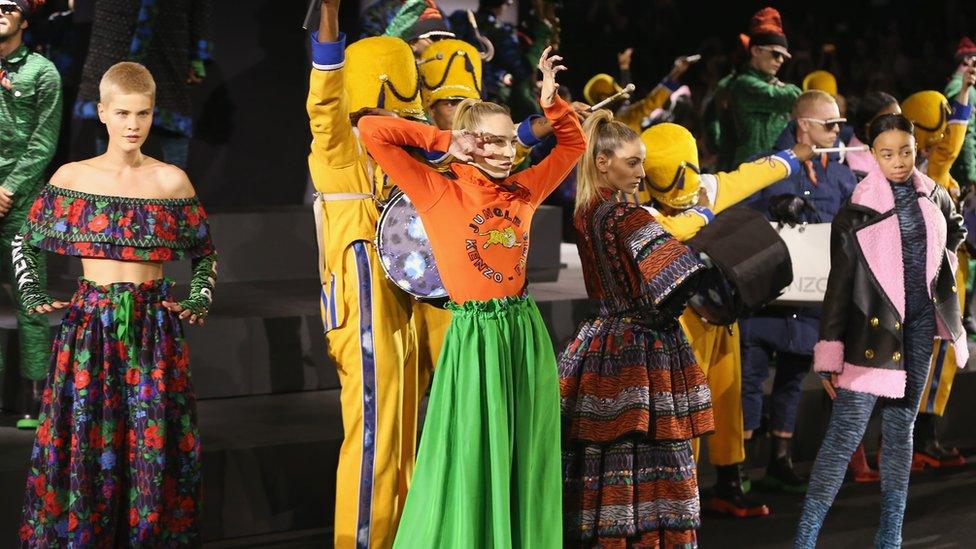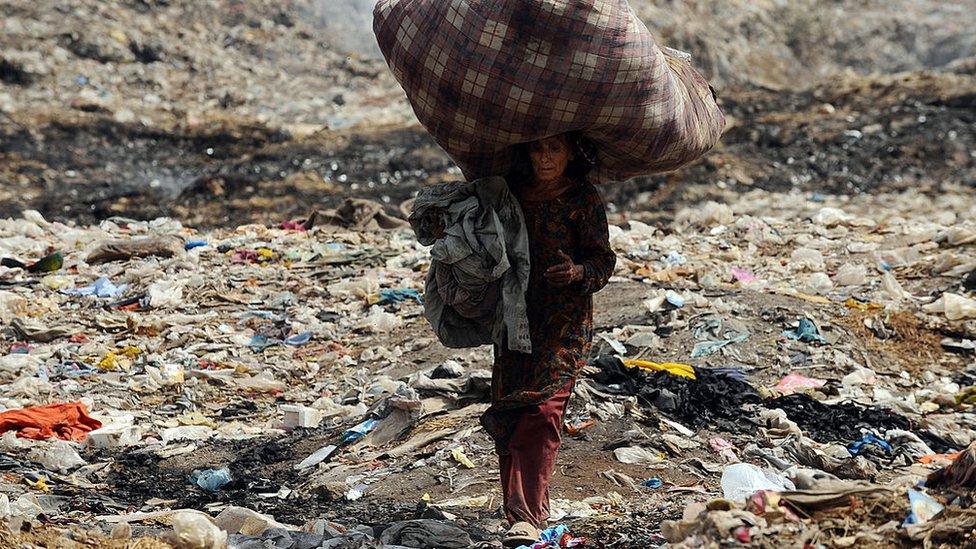Could reinvention solve our shopping addiction?
- Published

Some of our cheaper garments are discarded after we've worn them just seven or eight times
Swedish retail giant H&M seems an unlikely poster child for ecological living.
The High Street group, which owns brands including Monki and Cos and has more than 4,000 shops across the world, is one of the best known proponents of fast fashion.
It's a cheap and reliable source of trendy clothes which can be discarded as soon as another trend comes in.
Yet it has pledged to become "100% circular", ultimately using only recycled or other sustainable materials to make its clothes.
It's a journey that more fashion firms are beginning to take, with the so-called "circular economy" - which eliminates waste by turning it into something valuable - being seen as a possible solution to the vast amount of clothes that end up in landfill.

H&M is investing in textile recycling innovations and research
Last year, a fifth of the material H&M used was sustainably sourced, and it has gathered 32,000 tonnes worth of old clothing in the collection bins it has had in all its stores since 2013. The move was aimed at keeping the garments out of landfill, where three-fifths of clothing ends up.
H&M's sustainably sourced material makes up the equivalent of 100 million t-shirts - yet that is still a mere fraction of the £18bn worth of clothes it sold last year.
It's easy to accuse them of "green washing" - spending more time talking up their eco credentials than actually changing how they do things.
After all, aren't fast fashion and sustainability simply incompatible?
'Circularity is key'
"We believe that you can be both and we are using our size and scale to do good," says Catarina Midby, H&M's UK sustainability manager.
Asked if the solution is that people buy less she says it's "perfectly possible", but adds: "We cannot influence what people choose to spend their money on and we need to be profitable to drive fashion sustainability. Circularity is a key solution to the negative impact of consumption."
The firm is investing in textile recycling innovations and research, but currently, most clothes which involve a blend of materials such as polyester, nylon and cotton, are impossible to separate and recycle.
None of the clothes the firm produced last year were 100% recycled. As Ms Midby says the firm "is only at the beginning of our journey".

Some three-fifths of clothes are estimated to eventually end up in landfill
Clothing sales are continuing to rise around the world, particularly among the growing middle class in emerging market economies.
Globally the number of garments produced exceeded 100 billion for the first time in 2014, external, nearly 14 items of clothing for every person on earth.
Yet from the water and pesticides required to grow things such as cotton, to the chemicals and energy - mostly fossil fuels - involved in the manufacturing process, to our overflowing landfills, it's wreaking havoc environmentally.
"Overconsumption is the elephant in the room. We know it's a problem but we don't want to do anything about it," says Dr Helen Roby, a researcher at the Open University.
Her recent wardrobe audit project found people vastly underestimated the number of clothes they owned.

Zara-owner Inditex says that generating profit in the long term means operating in a sustainable way
Felix Poza, director of sustainability at Zara-owner Inditex, the world's biggest fashion retailer, says producing quality new fibres out of recycled garments is one of the sector's most important challenges.
It is currently working with Massachusetts Institute of Technology (MIT) and several Spanish universities on potential solutions, and claims sustainability is at the heart of all its decisions. For example, unusually it doesn't advertise and it says it analyses demand to minimise waste.
Ultimately, he says, "To generate profit in the long term means operating in a sustainable way."
It is this fear that the supply of natural resources involved in production, for example water, could become more scarce, which is most likely to force change.
"If you operate in the lower end of the market where cost is absolutely key then an increase in the raw material price is absolutely disastrous," says Geoff Lane, a partner at PwC.

Clothes made by Dutch Awearness can be completely recycled
Rien Otto, the founder and chief executive of Dutch Awearness, believes small firms like his offer a solution.
The firm started in 2012 as an EU-funded project to see if it was possible to make fabric that could be completely recycled.
The result from its collaboration with weavers was a polyester material that it now uses to make protective workwear, uniforms and suits.
When they're worn out or discarded, the material used to make them can be completely broken down and made into something else. Crucially, he says the price for the fabric is comparable to conventional materials, and lowers both water use and CO2 emissions.
Working together
Ultimately he wants to "lease" rather than sell its clothes, but currently it sells directly to other businesses, from whom it collects used clothing in exchange for a discount on future purchases.
Due to the scannable label it puts in each garment, which contains information on all the raw materials used in its creation, the customer knows exactly how to break the materials back down.
The firm is targeting €86m (£77m; $95m) in sales next year, but no-one is doing this kind of recycling on a commercial scale.
Mr Otto believes small firms will blaze the trail: "It's very easy for us to do research and development and bring in innovation. We can then work together with big companies to bring in solutions."
Yet it remains tough for smaller firms offering a sustainable alternative.

People Tree founder Safia Minney says consumers need to think about where they shop
People Tree, founded by Safia Minney over 25 years ago, was a pioneer in the sector, offering organic cotton and using production methods that minimised environmental impact long before it was fashionable.
Her desire was to show that it was possible to do fashion in a different way, while helping disadvantaged communities.
The firm made a loss last year and she says there is still very little capital for emerging ecological fashion brands trying to grow.
She believes the government should not charge VAT "on fair trade, ethical and sustainable products from the developing world as a way of levelling the playing field".
But she also says consumers need to think about where they're buying from.
"Use shopping as a vote. If your favourite brand isn't ethical, put pressure on them to disclose information. In the first world we have a voice and not to use it is disgraceful," she says.
- Published6 April 2016

- Published11 May 2016

- Published13 April 2016

- Published27 April 2016
